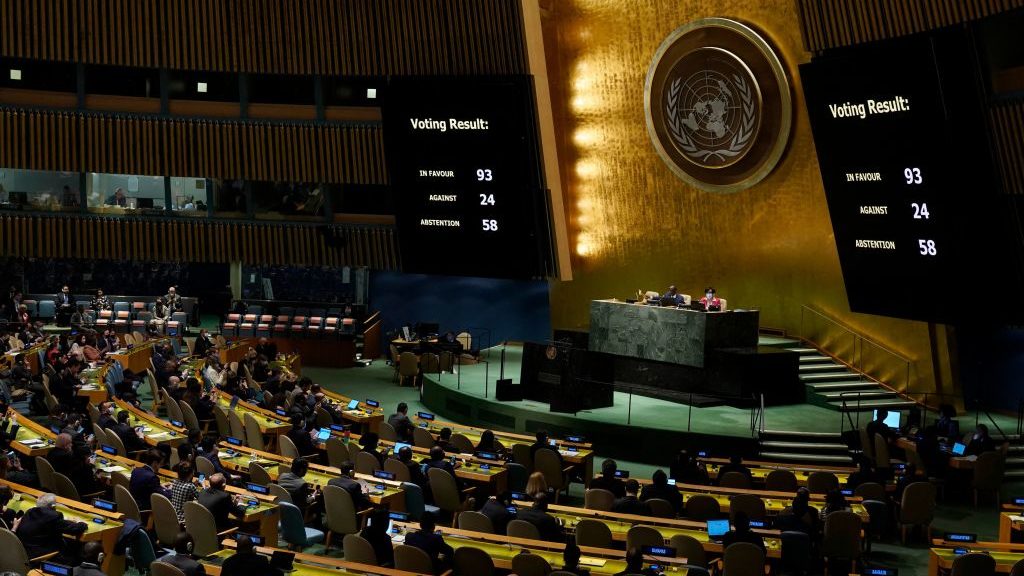Al-Sharaa Becomes First Syrian President To Visit UN in Nearly 60 Years
[Damascus] Syrian President Ahmed al-Sharaa arrived in the United States on Sunday, Sept. 21, to attend the 80th session of the United Nations General Assembly, marking the first visit by a Syrian president to the forum in six decades.
The media office of the Syrian presidency said al-Sharaa’s participation is part of the high-level United Nations sessions taking place in New York from Sept. 22 to 30, which will address key global issues ranging from peace and security to human rights and economic and social development.
Al-Sharaa’s participation is especially significant, as he is the first Syrian president to address the General Assembly since the late President Nureddin al-Atassi in 1967.
He is also the first Syrian leader to join the high-level week of the Assembly, when world leaders convene to discuss the foremost issues facing the international community.
The General Assembly, as the U.N.’s main representative body, discusses global issues and issues nonbinding recommendations, adopts the organization’s budget, elects nonpermanent members of the Security Council, and plays a role in appointing the secretary-general based on the council’s recommendation.
Al-Sharaa’s visit to New York comes months after his meeting with U.S. President Donald Trump on May 14, the first encounter at the presidential level in 25 years. At that time, President Trump announced the lifting of sanctions on Syria, describing al-Sharaa as “a true leader who led the revolution,” and saying he has “a real chance to preserve Syria’s unity.”
Give the gift of hope
We practice what we preach:
accurate, fearless journalism. But we can't do it alone.
- On the ground in Gaza, Syria, Israel, Egypt, Pakistan, and more
- Our program trained more than 100 journalists
- Calling out fake news and reporting real facts
- On the ground in Gaza, Syria, Israel, Egypt, Pakistan, and more
- Our program trained more than 100 journalists
- Calling out fake news and reporting real facts
Join us.
Support The Media Line. Save democracy.


The significance of al-Sharaa’s participation in New York also stems from his past, as he was previously known as Abu Muhammad al-Jolani and once topped the U.S. wanted list with a reward of up to $10 million.
The U.S. State Department had placed him on terrorism lists in earlier years as the leader of the Jabhat al-Nusra organization in Syria. His rise to the presidency marked a sharp break in his political and military career, raising questions about how the international community—especially Washington, which now officially hosts him at the U.N.’s highest forum—will respond to this change.
The modern history of relations between Damascus and Washington includes a series of rare summit-level meetings. On March 26, 2000, the late Syrian President Hafez Assad met U.S. President Bill Clinton in Geneva, in what was described as a “missed opportunity” to advance peace with Israel. That was the last meeting between a Syrian president and his American counterpart before Assad’s death in June of the same year.
Earlier, another meeting was held at the same hotel in 1994, when Assad pledged to Clinton that he would recognize Israel in exchange for a full withdrawal from the Golan Heights and a withdrawal from Lebanon as part of a comprehensive settlement. Assad also met U.S. President George H.W. Bush in November 1990, against the backdrop of the Second Gulf War, during which Syria joined the international coalition to drive the Iraqi army out of Kuwait.
The earliest meeting was with U.S. President Jimmy Carter in 1977, which failed to produce tangible progress in peace talks with Israel—an outcome many Syrians viewed as Assad deliberately stalling.
In another precedent, Damascus hosted U.S. President Richard Nixon in June 1974, making him the first American president to officially visit Syria.
The visit followed the signing of the disengagement agreement with Israel, which paved the way for restoring high-level diplomatic relations between Washington and Damascus.
Lebanese political analyst Omar Othman told The Media Line that al-Sharaa’s participation in the General Assembly “puts Syria back on the international map after years of isolation,” noting that his presence in New York serves as a test of whether new bridges can be built with the West, especially after the limited opening in relations with Washington following his meeting with Trump.
By contrast, Syrian journalist Nihad Hassan told The Media Line that this visit is “more than just a protocol event,” calling it “a message to the Syrian people that the country is entering a new phase of political legitimacy.” He stressed that al-Sharaa, through his presence, is trying to present himself to the world as a transitional president capable of managing major transformations after years of being associated with armed movements.
The participation of transitional President Ahmed al-Sharaa in the General Assembly carries both political and diplomatic weight, reflecting Syria’s effort to reenter the international arena after years of isolation and internal conflict. It also provides an opportunity to present a new Syrian vision for the country’s future during a sensitive transitional stage in which Damascus is seeking to rebuild foreign relations and reclaim its regional and international role.
The speeches of world leaders are expected to address issues such as international security, climate change, humanitarian crises, and Middle Eastern affairs. Al-Sharaa’s presence is seen as particularly significant in political and media circles, marking what many view as the beginning of a new chapter in Syria’s relations with the international community.
As Syrians and the international public await the results of this participation, observers consider it a real test of the transitional leadership’s capacity to engage with the international system and shape the political settlement of the Syrian crisis, now more than a decade old.

